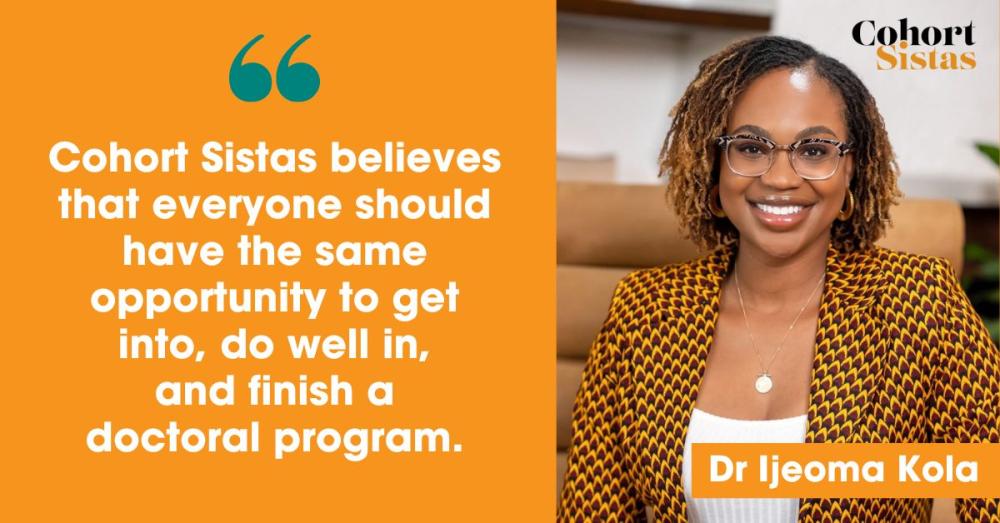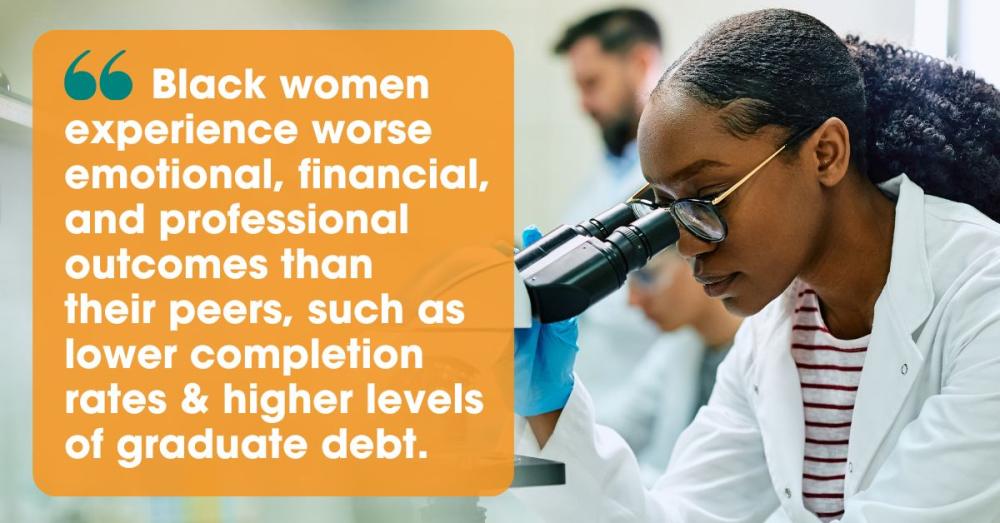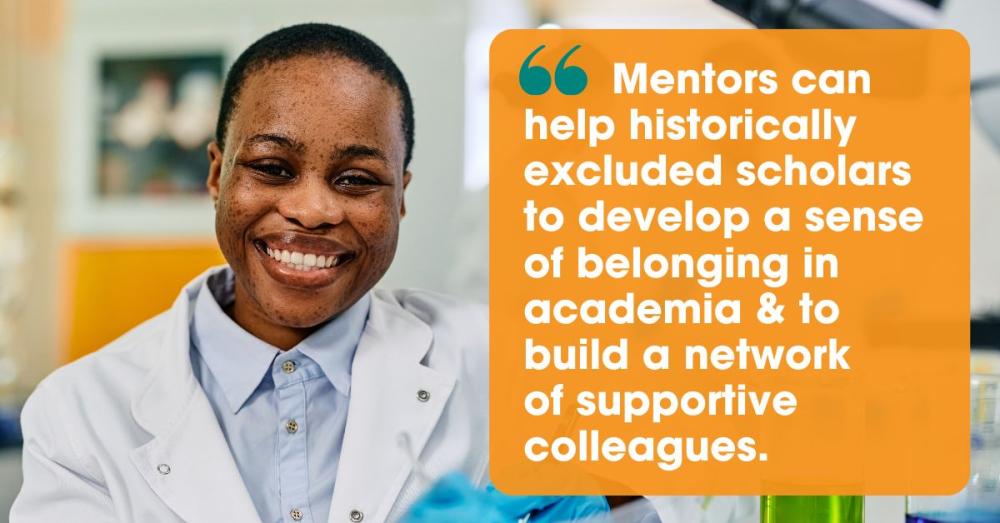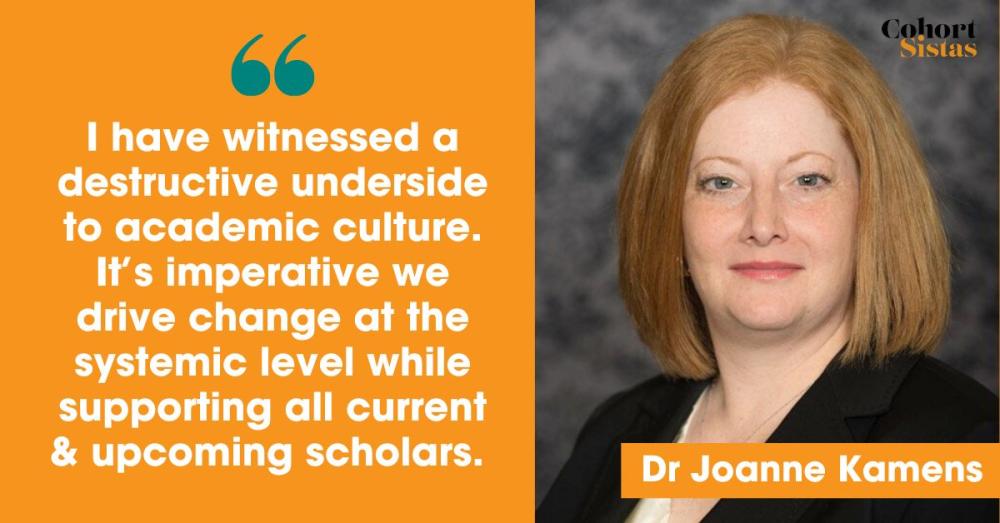Cohort Sistas: Support for Black Women & Non-Binary People in Academia
For women and non-binary people of color in academia today, the path to success in doctoral education is rarely an easy one. Despite greater awareness of issues around diversity and inclusion, still only 3% of research doctorates in the United States are earned by Black women. Lack of mentorship opportunities as well as issues such as bias, microaggressions and isolation mean that Black women and non-binary people are at a disadvantage throughout their academic journey.
Finding the right support can be difficult, however one organisation is leading the way in providing valuable digital resources for historically excluded scholars. Founded in 2020, Cohort Sistas now supports a membership community of over 3,000 Black women and non-binary doctoral students who have access to a variety of mentorship schemes, events, workshops, networking platforms, and more.
We spoke to Joanne Kamens, a STEM and DEI consultant who has recently joined the Board of Directors at Cohort Sistas. She told us more about the aims and objectives of the organisation, the challenges still facing Black women and non-binary people today, and why greater diversity and inclusion can benefit everyone in academia.
What are the aims and objectives of Cohort Sistas?
Joanne: Cohort Sistas believes that everyone should have the same opportunity to get into, do well in, and finish a doctoral program. We want to make sure that Black women, and non-binary people have the same support, guidance, and opportunities as everyone else. We want doctoral education to be fair so that people can use their knowledge to make the world a better place.
We are committed to making sure that women and people of color have a fair shot at getting a doctorate and going on to thrive in the global workforce. We want to make it easier for these scholars to get into and stay in advanced research programs. We're here to help doctoral students, people who are applying for programs, and people who already have their doctorates. We help them figure out how to navigate academia, build a meaningful career, and take care of their mental health.
How long has the organisation been operating, and why were you keen to get involved?
Joanne: Dr. Ijeoma Kola, the founder of Cohort Sistas, was the first in her family to pursue doctoral education and faced numerous professional, financial, and socio-emotional hurdles, including lack of mentorship, isolation as the only Black woman in many of her classes, and financial strain. In July 2020 Ijeoma founded Cohort Sistas to address underrepresentation and these unique challenges faced by Black women in doctoral programs.
This is such important work. I have a keen interest in effective, impactful support through group mentoring - my area of passion and expertise. I’d been supporting the work of Cohort Sistas through connections who were involved for some years via LinkedIn and was very honored when one of those connections recommended me for Board service.
What are some of the unique challenges that Black women and non-binary people face in doctoral education?
Joanne: Black women earn only 3% of doctoral degrees in the United States and experience worse emotional, financial, and professional outcomes than their peers, including lower completion rates, longer time to degree, and higher levels of graduate debt. Additionally, Black women doctoral students often report a lack of mentorship and community, compounded by microaggressions, bias, and isolation. People who identify as gender expansive face similar challenges and are almost universally targets of bias during their training. Of course those with intersectional identities can face even higher hurdles.
Unlike other organizations that focus solely on higher education admission or retention for historically excluded groups, Cohort Sistas also centers the well-being of its members, integrating mental health and wellness into all aspects of support to ensure that Black women doctoral students can thrive both academically and personally.
What types of resources and support programs does Cohort Sistas offer its members?
The Cohort Sistas’ strategy encompasses 3 core pillars: Mentorship, Community and Resources.
Mentorship Programs:
- Sista Circles: matched small-group mentorship program
- Success Collective: leadership development, group coaching, writing accountability, and peer & professional mentoring
Community Building:
- Digital community platform for networking, sharing experiences, and support
- Virtual and in-person wellness events
- Peer support groups
- Networking opportunities
Resources, Events, and Toolkits:
- Comprehensive scholarship and fellowship database
- Monthly professional development workshops (Success Series)
- Doctoral application course (Sankofa Application Academy)
- Annual Graduate School Fair
- Career Summit
Find out more here: https://www.cohortsistas.org/mentorship
How important is good mentoring for historically excluded scholars?
Joanne: Good mentoring is crucial for everyone but especially historically excluded scholars. Historically excluded scholars often face unique challenges in academia, such as biased actions, isolation, and a lack of access to resources and opportunities. Mentors can provide scholars with guidance, support, confidence and validation, helping them navigate these challenges. Mentors can also help historically excluded scholars to develop a sense of belonging in academia and to build a network of supportive colleagues. You can only “be it if you can see it”.
How does greater diversity and inclusion benefit everyone in doctoral education?
Joanne: Everyone who wants to, has a right to succeed in their academic pursuit regardless of their identities. I’ve been actively working to increase diversity and inclusion particularly for STEM scholars for more than two decades. During this time I have witnessed a destructive underside to academic culture which extends to all fields. It's imperative we both drive change at the systemic level as well as support all current and upcoming scholars the way Cohort Sistas does.
This change is more than just a benefit - it’s an absolute necessity. The United States has a majority of people who identify as non-white or as not-male. If we don’t do better, we won’t have enough talent to serve our workforce. We won’t innovate in the unbiased ways we need to.
An anecdote from my own experience: Some years ago I started having frightening heart palpitations. I thought I was on the verge of a heart attack for weeks. I finally managed to get an appointment with a fairly renowned cardiologist who told me I was “just having anxiety and to seek out some meds for that”. Turns out, this type of heart activity is a very common symptom of perimenopause (which in retrospect, I was clearly experiencing). It’s shameful that this doctor didn’t ask me if I was having other symptoms that would confirm this instead of dismissing me as a little “hysterical” - as women have been told all through history. We need more scientists with diverse identities studying and publishing on medical issues.
What are you looking forward to most in your role on the Board of Directors?
Joanne: I love working with other people who are passionate about increasing inclusion and diversity and who are addressing issues with concrete, impactful approaches. Working with the rest of the Board, Staff and community is what I like most.
How can our readers find out more about Cohort Sistas?
Please see the Cohort Sistas website and follow Cohort Sistas on LinkedIn to learn more about our programs and to be informed of registration dates. I am happy to talk to anyone who reaches out and, of course, as a nonprofit we are always actively seeking sponsorship! If you or your organization would like to become a sponsor - definitely reach out to me!
Connect with Joanne:
- LinkedIn: Joanne Kamens, PhD
Read Joanne’s guest article on the Hello Bio blog: STEM Career Paths for Life Scientists
________________________________
Additional resources from Hello Bio
For more articles on diversity and inclusion in STEM, as well as other valuable resources for female scientists, take a look at these articles on the Hello Bio blog:
- Promoting Diversity in STEM Online - guest blog by Mackenzie Lemieux and Rebecca Zhang
- Gender Bias from a Woman in Science - guest blog by Kay M. Tye
- Overcoming Challenges as a Woman in STEM - guest blog by Gagandeep Kaur
- Ten Effective Support Networks for Women in STEM
- Are Things Improving for Women in STEM?
- Ten Inspiring Women in Science History
- Words of Wisdom from Women in STEM
- Supporting Women in STEM - Resources for Female Researchers
- 10 Award-Winning Black Scientists You Should Know About
- Ten LGBTQ+ Scientists You Should Know About
- How Can We Increase the Visibility of LGBTQIA+ Researchers in STEM? - guest blog by Ray Das
________________________________
If you enjoyed this article, why not check out the other resources available on our blog. We are passionate about supporting life scientists including early career life scientists and PhD students - with really low-priced reagents, antibodies and biochemicals, early career scientist grants, and resources to help with both personal and professional development. We know how tough it is - so we hope you find these helpful!
More General Support for Life Scientists
For advice on wellbeing, dissertations, presenting at conferences, wellbeing, PhD support, networking and lots more, we have a huge range of articles to help - just click below:
Save up to 50% on our high purity reagents...
When you get to the stage of planning your experiments, don't forget that we offer a range of low-cost, high-purity agonists, antagonists, inhibitors, activators, antibodies and fluorescent tools (yes - they really are around half the price of other suppliers!) You can use our Quick Multi-Search Tool to search for lots of products in one go, and the range includes:
- Enzyme inhibitors and activators
- Chemogenetic ligands
- Ion channel modulators
- GPCR & ionotropic receptor ligands
- Cell biology reagents & biochemicals
Technical resources
Try our Molarity Calculator: a quick and easy way to calculate the mass, volume or concentration required for making a solution.
Try our Dilution Calculator: an easy way to work out how to dilute stock solutions of known concentrations
We also offer a comprehensive range of technical resources including antibody protocols and methods, product guides and mini-reviews:
And finally, don't forget to check back in with our blog regularly for our latest articles. If there’s something you’d love to contribute to the community, whether that’s an interview or article, drop us a line at hello@hellobio.com
---























